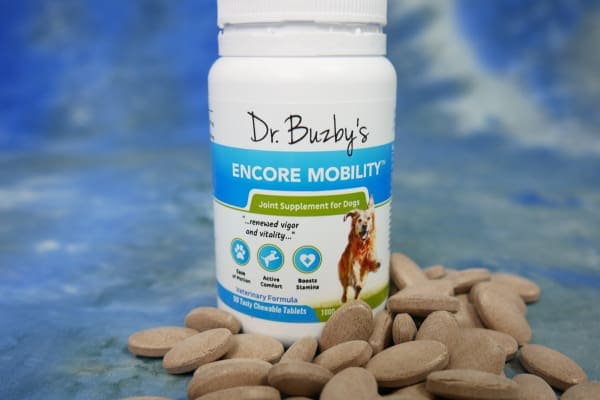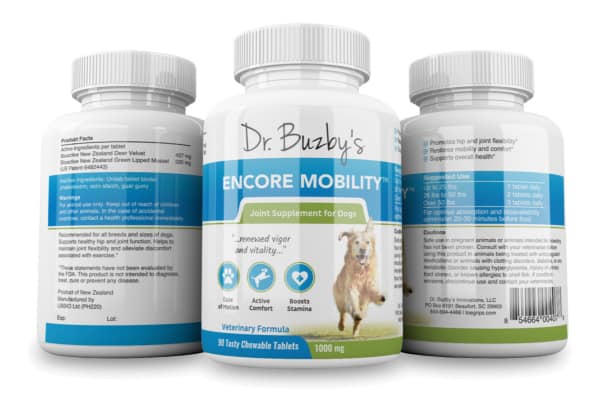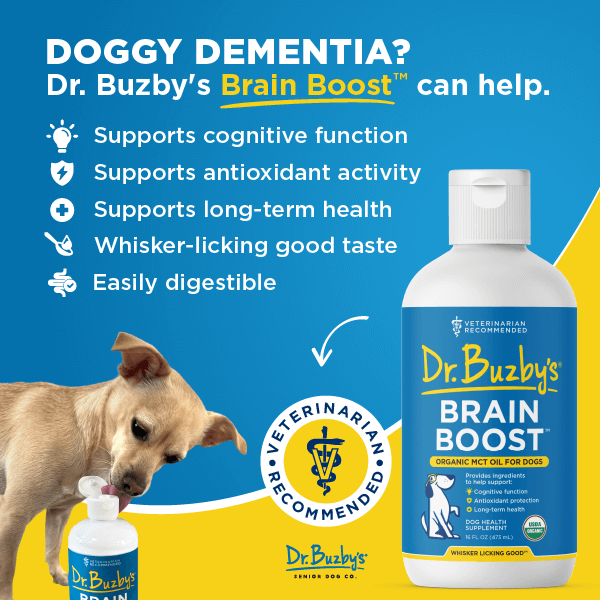There is no doubt that senior dog supplements are beneficial. But with the vast array of supplements for elderly dogs on the market, how do you ever go about picking the right one? Integrative veterinarian Dr. Julie Buzby discusses why senior dogs need supplements, defines common supplement terms, and explains how to pick a safe and effective senior dog supplement. Plus she discusses four supplements that are great for older dogs.

As a practicing veterinarian with over 25 years of experience and the founder of Dr. Buzby’s Senior Dog Co., I believe strongly in the value of supplements for older dogs. In fact, I’m so convinced of their benefits that I’ve spent countless hours learning everything I can about them.
In keeping with my commitment to using and recommending safe, effective, and high-quality dog supplements, I’m proud to say that my veterinary team and I have poured our hearts and souls (and a good measure of blood, sweat, and tears) into developing several excellent supplements to meet the needs of a population of patients who are particularly near and dear to my heart—senior dogs.
With a 2024 study indicating that 76% of cat and dog owners are seeking supplements that can improve their pets’ health and wellness, picking the right one is a big deal. Whether you use my supplements or not, I want to help you know how to make an informed choice when selecting supplements for your senior dog. Along the way, I will also share a list of ingredients and supplements that I consider top-notch for older dogs.
Should I give my senior dog supplements?
Just like senior citizens, senior dogs often face unique health issues. Luckily, supplements can often be part of the solution.
As dogs age, arthritis sets in, challenging their comfort, mobility, and ultimately, quality of life. And because dogs are living longer due to advances in veterinary care, more and more of them will also begin to show signs of cognitive decline. A study indicated that 28% of dogs will show signs of dementia by the age of 11 or 12, and that number increases to a shocking 48% by the age of 14.

Aging takes a toll on other body systems, too. Dental disease, heart disease, endocrine disorders like hypothyroidism or Cushing’s disease, cancer, kidney and liver disease, and other health problems become more and more prevalent as a dog advances in years.
As an integrative veterinarian, I do use prescription medications to help my patients. But what I love about supplements is that they can work well with minimal side effects. Thus, for my senior patients, I try to prescribe supplements first and then add medications as needed.
Note: For some conditions such as the endocrine disorders listed above, medications may be a necessary part of the treatment plan from the start. Your veterinarian can help you find the right approach for your dog.
How can supplements help senior dogs?
To help you understand how supplements can improve your dog’s quality of life, let’s use arthritis as an example. My clients often ask me if their elderly dogs have arthritis. I commonly reply that it’s impossible for them not to. Dogs are so stoic; sometimes they are hurting without showing us.
Therefore, senior dog joint supplements containing glucosamine and chondroitin are often a first step in treating my older patients. Green-lipped mussel (GLM) or other sources of glucosamine and chondroitin can help maintain and repair joint cartilage and improve joint lubrication. Plus, as we’ll discuss in a bit, GLM has fantastic anti-inflammatory properties. This is so important because arthritis is an inflammatory condition as well as a painful one.
(Additionally, because inflammation can contribute to cognitive decline, it is even more important to use supplements that reduce inflammation as well as improve joint health.)
I often find that after starting a joint supplement, my senior patients are able to move around more freely and with less pain. Sometimes, their parents don’t even realize how much arthritis was holding their dog back until their dog’s joints suddenly feel better. I’ve had a number of amazed dog parents comment that their dog seems happier and more puppy-like again after several months on a joint supplement.
Supplements for older dogs 101
Before diving into the specifics of elderly dog supplements, it’s important to get an overview of “supplement language.” Understanding what different terms mean—and don’t mean—can help you choose the right product for your pup.
What is a supplement?
A supplement is just what its name suggests—a substance such as a vitamin, mineral, herb, amino acid, or a combination of them used to supplement the diet. Supplements are typically administered in pill, capsule, tablet, soft chew, or liquid form.
In 1984, the U.S. Federal Drug Administration (FDA) got involved in the fast-growing dietary supplement industry. They officially defined supplements in the Dietary Supplement Health and Education Act of 1984 (DSHEA). However, the 1984 Act only applies to human supplements. This means that FDA oversight and regulation excludes supplements for dogs.

What does this mean for senior dog supplements?
Thus, the term “dog supplement” is nonexistent, at least by government standards. While the FDA does have a Center for Veterinary Medicine, it only regulates two classes of animal products—food and drugs. Since the government doesn’t recognize pet supplements as their own category, they are classified as foods, as long as product labels don’t make medical claims.
What is a “nutraceutical”?
“Nutraceutical” is a portmanteau combining the words “nutrient” and “pharmaceutical.” It was coined in 1989 by Stephen De Felice, founder of the Foundation for Innovation in Medicine. De Felice defined the term as a “food, or parts of a food, that provide medical or health benefits, including the prevention and treatment of disease.”
If you think that sounds similar to a dietary supplement, you’d be spot on. For our purposes, the terms “senior dog supplement” and “senior dog nutraceutical” are interchangeable. Both are food-related products used to promote health.
What do you need to know about senior dog supplements?
Two words sum up the culture surrounding senior dog supplements: Buyer beware. Here’s why…
Supplements may not contain what the label claims
I remember attending a veterinary continuing education conference years ago where a speaker said something that made me ask her to repeat herself. She referred to a study done by an American pharmacy school that concluded that a large percentage of nutraceuticals had different contents and concentrations in the bottle than what they claimed on the label. Other, more recent studies point to the same problem.
This is not only concerning from the standpoint of companies skimping on active ingredients, but also because it means products may contain toxins, heavy metals, mold, and bacteria due to lack of accountability and regulation.
Keep in mind, these studies were conducted on human supplements! Supplements for dogs are under even less scrutiny.
Supplement safety is up to the manufacturers
According to the FDA, “Under DSHEA, a firm is responsible for determining that the dietary supplements it manufactures or distributes are safe and that any representations or claims made about them are substantiated by adequate evidence to show that they are not false or misleading.”

Translation: Dietary supplements do not need approval from the FDA before being sold to the public. Supplement manufacturers are tasked with regulating themselves. Unfortunately, not all manufacturers are trustworthy, leaving patients and consumers to suffer the consequences.
In summary, the FDA doesn’t regulate supplements in the same way it does drugs. Unlike drugs and vaccines, which undergo rigorous testing before approval, the FDA considers supplements safe until proven otherwise. See the difference? Considering the vast number of supplements on the market today, it’s critical that dog parents choose supplements wisely.
Not all supplements do what they claim
The market for elderly dog supplements is expansive and growing exponentially year over year. A 2024 study on pet supplements indicated that US consumers spent over $2.7 billion on supplements in 2024, a 19% increase from 2022. Senior dog supplements are big business, and not all companies are created equal.
Many supplement manufacturers make honest claims that their products can improve your dog’s quality of life. However, other companies are predatory and sell inferior products simply to make a profit. It is important to be able to distinguish between the two so you can pick a safe and effective supplement for your dog.
How do you choose the right supplement for your dog?
With all there is to consider about supplements, the idea of picking one is understandably daunting. Here are a few pieces of advice that may help you.
Ask your veterinarian for his or her recommendations
Your veterinarian is the best resource to guide you in these product decisions. He or she knows which ingredients, supplement brands, or specific supplements are safe and effective. Chances are, he or she may even have a few favorite supplements for some of the more common senior dog problems.
Pick a supplement designed for dogs
Personally, I recommend my clients choose a supplement specifically made for dogs (or animals in general). A dog’s body may not have the same ability to digest and absorb nutrients as a person’s. Therefore, human supplements may not have the expected benefits in dogs.
Beware of supplement buzz words

If you do any research into supplement options, you’ll soon stumble upon a veritable gold mine of buzzwords. “Natural” is the big one for me. With the level of regulation that supplements are held to, the term “natural” only means that it is derived from nature. This does not necessarily imply that the product is appropriate or healthy for your dog.
Most of these buzzwords are designed to make you think those products will help your dog. But they are often little more than a marketing scheme. Empower yourself to dive deeper into the ingredients and discuss which products will be the best supplement choice with your veterinarian.
Become a label reader
I often advise my clients to become label readers. It’s important to know what is in the supplement, how to give it to your dog, and what it claims to do for your dog. All of this information should be on the label and is worth looking at for yourself.
4 “Must have” supplements for senior dogs
If I were to create a list of “must-have” supplements for aging dogs, it wouldn’t be black and white. Instead, there would be a whole lot of grey because every senior dog is an individual with different needs. However, many of our grey-muzzled companions can benefit from supplements that include ingredients such as:
- MCT oil for dogs
- Omega-3 fatty acids
- Green-lipped mussel
- New Zealand deer velvet

Let’s take a closer look at each of these superstar supplements.
#1: Medium chain triglycerides (MCTs): great for dogs with dementia or seizures
Medium-chain triglycerides (MCTs) are fatty acids derived from palm kernel or coconut oil. MCTs have become a valuable health supplement both for slowing the progression of dementia (canine cognitive dysfunction) and curtailing the frequency and severity of seizures in dogs. The two essential MCTs we’ll discuss here are caprylic (C8) and capric (C10) acid.
Caprylic (C8) acid is converted to ketones after being absorbed from the digestive tract and directly entering the major blood vessels of the liver. These ketones then cross the blood-brain barrier, making them readily available as a quick energy source for the brain. This is vital for senior dogs, who have trouble breaking down glucose, the brain’s typical fuel, as they age.
Capric (C10) acid also provides dogs with extra energy. It accomplishes this by working at the cellular level to support the production of mitochondria—the “powerhouse of the cell.” More mitochondria mean more power for your aging dog’s brain, which is also a good thing.
Additionally, capric acid protects the neurons that transmit signals between the brain and nervous system. This keeps the neurons from becoming hyperexcitable, which is important because neuron hyperexcitation is typically what triggers a seizure. By increasing the seizure threshold (the level of neurological stimulation necessary to trigger a seizure), capric acid helps decrease the frequency and severity of seizures in dogs with epilepsy.
So what does this mean for your older dog?
MCT oil can help decrease the signs of dementia
Because of the effects of C8 and C10 on the brain, MCT oil helps senior dogs with dementia symptoms regain their dignity. It provides an alternative source of brain fuel and protects the brain and nervous system tissues from inflammation and oxidative stress.
Plus, by helping lift the “brain fog” that often comes with dementia, MCT oil for dogs may allow them to think more clearly, remember how to go about their daily routines, and enjoy more normal interactions with their family and other pets. Unfortunately, there’s no way to turn back the clock on dementia once symptoms have appeared. But MCT oil can help slow its progression.
MCT oil can reduce seizures in dogs
Research has also shown that MCT oil can help reduce seizure activity in dogs of any age. It is effective as a complementary therapy for dogs already on prescription anti-seizure medications. Plus it works for dogs whose seizures are infrequent enough that they don’t require daily medication.
What is the best MCT oil supplement for dogs?
This is where Dr. Buzby’s Brain Boost™ organic MCT oil for dogs—Dr. Buzby’s Senior Dog Co.’s newest supplement offering, comes in to save the day. Brain Boost is intentionally formulated with only caprylic (C8) and capric (C10) acids, and is free of flavorings, dyes, or preservatives.
Importantly, Brain Boost does NOT contain lauric (C12) acid. This is worth taking note of when reading labels because lauric acid has the potential to cause digestive upset in dogs with dietary sensitivities or a history of pancreatitis.
Adding Brain Boost into your dog’s daily routine is easy—just mix each serving with food twice daily. And dogs love the “whisker licking good” taste! Brain Boost is a safe, natural supplement option for senior dogs with dementia or dogs of any age suffering from epilepsy.
#2: Omega-3 fatty acids: a supplement that benefits the whole body
Fatty acids are essential components of a dog’s daily nutritional intake. Since dogs cannot produce fatty acids, they must consume them. There are three omega-3 fatty acids of particular importance, which we’ll discuss here. They include eicosapentaenoic acid (EPA), docosahexaenoic acid (DHA), and alpha linoleic acid (ALA).
The omega 3 fatty acids for dogs, EPA and DHA, are essential for dogs’ brain, heart, joints, skin, and immune system. This makes them a great supplement for heart disease in dogs, kidney failure in dogs, allergies, arthritis, and more. Additionally, EPA and DHA help decrease inflammation in the body. You may even recognize DHA and EPA as additives in human baby formula as they play critical roles in neonatal brain development and support normal retinal function in the eyes.
The best natural sources of EPA and DHA are:
- Cold-water fish (like sardines and salmon)
- Shellfish (like green-lipped mussels, which we’ll talk more about shortly)
- Certain species of squid (calamari)
- Krill
- Seaweed (nori—think sushi wrappers)
- Certain types of microalgae (spirulina).
Conversely, ALA is typically derived from tree nut, vegetable, and seed oils like walnut, soybean, canola, chia, and flaxseed. It must be converted into DHA and EPA to be useful. Dogs aren’t great at making that conversion, which is why plant-based omega-3 supplements are inferior to ones made with the natural sources of EPA and DHA listed above.
What is a great omega-3 supplement for dogs?
My go-to omega-3 fatty acid supplement is the Nordic Naturals Omega-3 Pet™ product line. I love it because it contains EPA and DHA harvested from cold-water fish like wild anchovy and sardines.
#3: Green-lipped mussel: wonderful for dogs with arthritis
The green-lipped mussel is a sustainable shellfish native to New Zealand. Studies investigating the health benefits of green-lipped mussels in humans began increasing in the 1970s. That’s when researchers discovered that members of the Māori tribe, indigenous to New Zealand’s coastal areas, experienced far fewer issues with arthritis than communities further inland.
What are the benefits of green-lipped mussel?
Green-lipped mussel contains a treasure trove of essential nutrients for humans and animals alike. These nutrients include:
- Glycosaminoglycans (chondroitin sulfate and glucosamine) which are vital for joint health.
- Fatty acids (EPA, DHA, and ETA) which support brain, heart, joint, skin, and immune system health.
- Potent anti-inflammatory properties thanks to EPA, DHA and ETA. Eicosatetraenoic acid (ETA) blocks a different inflammatory pathway in dogs than EPA or DHA. This gives green-lipped mussels a distinct advantage in providing better protection against inflammatory processes than many other fish oil-based supplements on the market.
- Minerals (zinc, iron, and selenium) which are vital for immune system function, enzyme activity, wound healing, and red blood cell production.
- Vitamins (C, E, and several B vitamins) which are vital for neurologic function, wound repair, and immune function.
That’s a LOT of healthy stuff packed into one tiny little shellfish! As I learned about the incredible benefits of green-lipped mussels, I knew they would make a wonderful joint supplement for dogs. (More on that soon!)
#4: New Zealand deer velvet: Another fantastic joint supplement
As it turns out, New Zealand is also home to another incredibly powerful supplement source, deer antler velvet. Yes, you read that correctly. Deer antler velvet is humanely harvested and ethically sourced from two species of deer native to New Zealand.
The regulations for harvesting antlers in New Zealand are stringent, requiring the oversight of a veterinarian during the process. This includes using local anesthesia so the newly grown antlers can be removed without causing pain to the deer. Once harvested, the antlers are ground into powder, which can then be incorporated into supplements. Deer antler velvet is a perpetually renewable nutrient source since deer regrow their antlers yearly.
What are the benefits of New Zealand deer velvet?
Like green-lipped mussel, deer antler velvet contains many important nutrients that have health benefits across both human and veterinary medicine. The most valuable of these include:
- Glycosaminoglycans—Glucosamine and chondroitin for joint health and hyaluronic acid (HA) for joint lubrication
- Collagen—A vital building block for healthy bones, ligaments, tendons, and joints
- Protein—Specifically, the pilose antler peptide, which provides anti-inflammatory properties and supports a healthy immune system
- Growth factors—IGF-1 and EGF, which are critical for new tissue growth and wound healing
- Minerals—Calcium, phosphorus, and other trace minerals vital for bone, nerve, and muscle health
Considering the numerous benefits of green-lipped mussel and deer antler velvet, it made sense to formulate a supplement containing both ingredients! Based on this research, Dr. Buzby’s Encore Mobility™ hip and joint supplement was born.
Save 10% on Encore Mobility™ Joint Supplement for Dogs

Give your dog more good days.
Use promo code HAPPY to save 10% on Encore Mobility.
In Encore Mobility, deer antler velvet works synergistically with the green-lipped mussel to provide a superior joint supplement for senior dogs. Dosed daily, Encore Mobility gives senior dogs relief from arthritis pain, renewed energy, and improved stamina.
All these great benefits come packaged in a tasty chewable tablet. Even the most finicky eaters love the taste of Encore Mobility. Just drop it in your dog’s food each day or offer it as a treat!

Work with your veterinarian to select the right supplement
By sharing an overview of what to look for in senior dog supplements, I hope I’ve helped guide you along your journey to choosing the best supplement for your senior dog. Remember to always consult your veterinarian before starting any new supplement or over-the-counter medication! He or she can partner with you in finding a supplement that can boost your dog’s quality of life—increasing happiness at both ends of the leash!
Have supplements helped your senior dog?
Share your experience in the comments below.
This post was updated on May 19, 2025.



When should you start your dog on these supplements? Our dog is going to be 4 years old in June and is a very active male Brittany. We have given him Fish oil and Dasaquin (for joints) since we adopted him 2 years ago.
Hi Arianne,
This is a great question! There really is no definitive age that is recommended for when to start supplements. Most joint supplements work well to help prevent or delay the onset of arthritis if started early. Many other types of supplements are most beneficial if started near the onset of the disease or condition they are trying to treat. If you are curious about when to start a specific supplement, I would encourage you to discuss it with your vet. Since they have a better understanding of your dog’s medical details, they can offer more specific advice. Best wishes to you and yours!
Is anyone else getting an error with the code HAPPY? Was going to give encore a shot, but with my giant breed dogs both needing 3 pills each per day I need all the help I can get…
Hi Jessicah,
After reading your comment just now, I reached out to our customer service team. They tested the code and said it was working properly. Please give it another try and if you are still having issues contact [email protected]
They will make sure to take good care of you!
Thanks so much for the quick reply! I tried again and it didn’t work. I took screenshots and will email customer service. Thanks for all you do, I genuinely look forward to and thoroughly read each email. I’ve found some really helpful info in them. 🙂
My last dog was euthanized at 15 years old. I started her on a triple strength glucosamine chondroitin supplement when she was about 7. While she was experiencing severe hind end weakness and fecal incontinence at the end, my vet said he couldn’t detect any arthritis in her joints.
Our new dog is about 5-6 years old and is on a well know joint supplement and an omega 3 supplement. I’m hoping he has a very long life!
Btw, I’ve also started taking an Omega3 !
Hi Karen,
That is amazing! Thank you for sharing your experience with us. Best wishes to you and yours!
Hi there! I am hoping to read part II with your go-to brands and supplements but I’m having trouble locating it. Would you mind directing me?
Hi Misty,
Here is a link to Part II about supplements: 3 Natural Supplements for Dogs Like Yours
I am sorry the wording for the blog title didn’t make this clearer. Thank you for bringing this to my attention!
It’s SO hard to come by good vitamins for older dogs. These seem like they would pair with the Balanced Breed Vitamins that I give my dog. My dog is very picky about what she consumes so the flavor of Balanced Breed has been really great for her. Do these have a flavor as well? I will be sure to check out Dr. Buzby’s!
Hi Adrianna,
Which supplements are you specifically asking about the flavor? I will try my best to get answers for you or point you in the right direction toward reliable information.